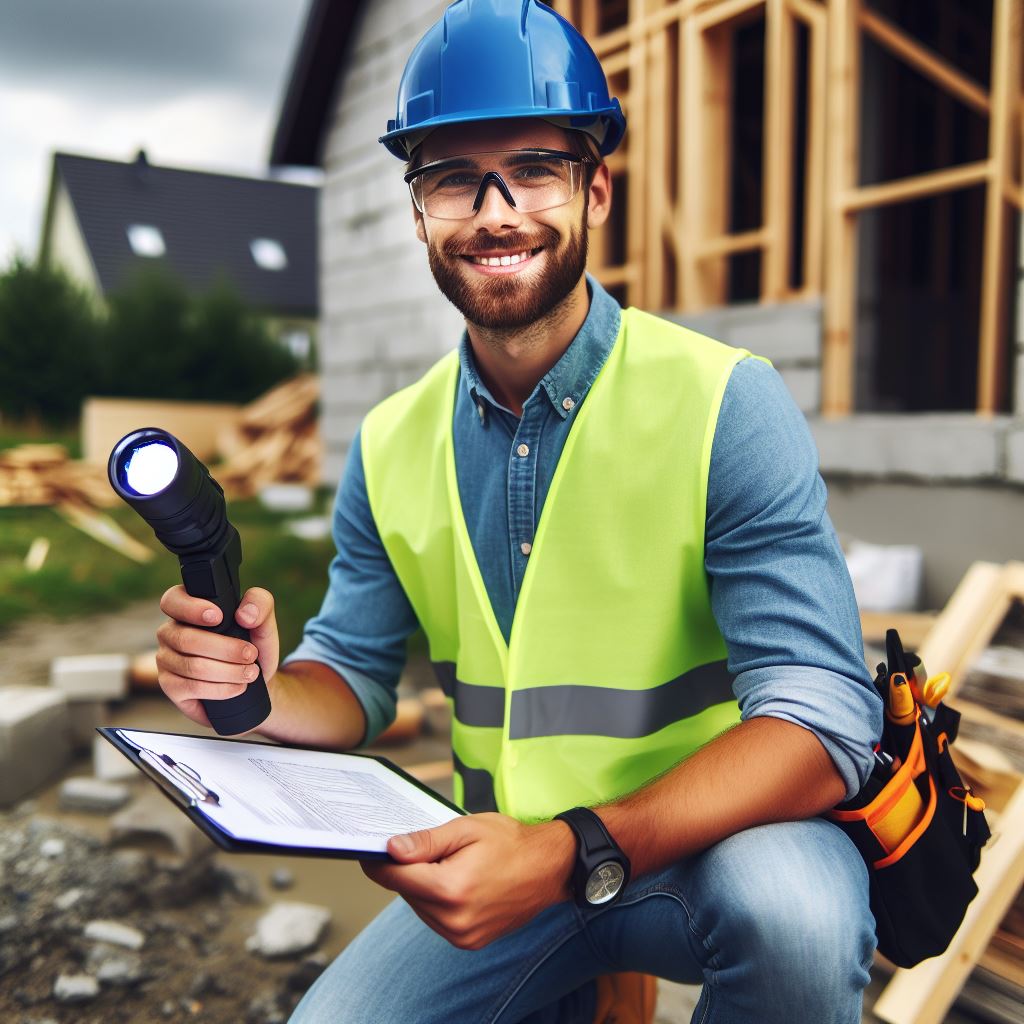Introduction
Why Home Inspections Matter
Home inspections play a pivotal role in the real estate transaction process.
They are not merely formalities but rather essential steps that can potentially save buyers from significant financial burdens and ensure the safety and security of their future homes.
Inspectors delve deep into various aspects of a property, meticulously examining its structural integrity, functionality, and safety features.
From the foundation to the roof, no corner is left unchecked.
These examinations can unveil hidden problems that are not immediately apparent to the untrained eye.
Common Pitfalls to Watch Out For
Despite the importance of home inspections, many buyers fall into common pitfalls that can jeopardize the integrity of their investment.
Oversights in areas such as electrical systems, plumbing, insulation, and ventilation can lead to long-term issues that may not surface until after the purchase is complete.
Moreover, structural concerns, such as foundation cracks or roof leaks, can significantly impact the property’s value and safety.
Failure to detect these issues during the inspection can result in costly repairs down the line, turning what seemed like a dream home into a nightmare.
Purpose of this Blog Post
The purpose of this blog post is to shed light on these common pitfalls and provide buyers with the knowledge and tools they need to navigate the inspection process successfully.
By understanding what to look for and how to address potential issues, buyers can approach home inspections with confidence and ensure that their investment is sound.
Through informative discussions and practical tips, this post aims to empower buyers to make informed decisions and protect their interests throughout the home buying journey.
By being proactive and vigilant during the inspection process, buyers can mitigate risks and pave the way for a smoother and more satisfying real estate experience.
Choosing the Right Home Inspector
Research and ask for recommendations
- Utilize online resources and ask friends, family, and real estate agents for recommendations.
- Read online reviews and testimonials to gather information about the inspector’s reputation.
- Inquire about the inspector’s communication skills and ability to explain complex issues.
Check for credentials and certifications
- Ensure the home inspector holds a valid license and is certified by a reputable organization.
- Verify if the inspector has received any specialized training or additional certifications.
- Research the requirements and regulations for home inspectors in your specific area.
Evaluate experience and expertise
- Consider the number of years the inspector has been in the industry.
- Ask about the inspector’s experience with homes similar to the one you are interested in.
- Inquire about their knowledge of building codes and common issues found in homes.
Consider professional affiliations
- Research if the home inspector is a member of any professional organizations or associations.
- Affiliations can indicate a commitment to ongoing education and high ethical standards.
- Check if the inspector adheres to a strict code of ethics and professional standards.
Choosing the right home inspector is crucial in ensuring a thorough and reliable inspection.
By following these guidelines, you can avoid potential pitfalls and have confidence in your choice.
Research and recommendations provide valuable insights into an inspector’s reputation and capabilities.
Checking credentials and certifications guarantees their compliance with industry standards.
Evaluating experience and expertise ensures their familiarity with various types of properties and potential issues.
Considering professional affiliations gives you the assurance of their commitment to professionalism.
Remember, selecting the right home inspector is an investment in your future home and peace of mind.
A knowledgeable and thorough inspector can save you from costly surprises down the line.
Don’t rush this essential step in the home buying process – take your time to choose wisely.
Investing today can save you from potential pitfalls tomorrow.
So, make an informed decision and hire a reliable and qualified home inspector for your next home purchase.
Read: The Art of Decoding Real Estate Listings
Understanding the Scope of Inspection
Types of inspections (general, specialized, additional services)
When it comes to home inspections, there are different types available to cater to specific needs.
The most common type is a general home inspection, which gives a comprehensive assessment of the overall condition of the house.
Specialized inspections, on the other hand, focus on specific areas such as electrical systems, plumbing, or the foundation.
Additionally, home inspection companies may offer additional services like radon testing or termite inspections.
Components covered in a standard home inspection
During a standard home inspection, a qualified inspector examines various components of the property to identify any potential issues.
This typically includes the inspection of the structural elements, such as the foundation, roof, walls, and floors.
The inspector also looks at the exterior components, including the siding, windows, doors, and drainage systems.
Inside the house, the inspection encompasses the electrical and plumbing systems, HVAC (heating, ventilation, and air conditioning), as well as the appliances and fixtures
Finally, the inspector checks for any signs of water damage, mold, or pest infestations.
Services not typically included in a home inspection
While a standard home inspection covers a wide range of components, there are certain services that are usually not included.
For instance, inspections for pools, septic systems, or well water quality may require specialized inspections that go beyond the scope of a general inspection.
Additionally, home inspections do not typically cover testing for asbestos, lead-based paint, or environmental hazards.
In such cases, it is essential to hire specialized professionals to assess these specific concerns.
Importance of reading the inspection agreement thoroughly
Before scheduling a home inspection, it is crucial to understand the terms and conditions outlined in the inspection agreement.
This agreement specifies the scope and limitations of the inspection, ensuring that both the inspector and the client are on the same page.
It is important to carefully review the agreement to determine what will be inspected, what may be excluded, and any additional services that may incur extra fees.
By thoroughly reading the inspection agreement, homeowners can set realistic expectations and avoid any misunderstandings or disappointments during the inspection process.
In fact, understanding the scope of a home inspection is vital for homeowners.
Different types of inspections cater to specific needs, ranging from general assessments to specialized inspections.
A standard home inspection covers various components, ensuring a comprehensive evaluation of the property.
However, certain services like pool inspections or testing for environmental hazards may be excluded.
Before scheduling a home inspection, individuals must carefully read the inspection agreement to grasp the full scope of the inspection and avoid any surprises.
By doing so, homeowners can ensure a smooth and thorough inspection process.
Preparing for the Home Inspection
Checklists and guidelines for homeowners
- Start by creating a checklist to ensure you don’t miss any important steps during the home inspection process.
- Research online for comprehensive lists of what to look for during a home inspection.
- Make note of any areas or items that have been recently repaired or replaced to provide accurate information to the inspector.
- Consult with your real estate agent or friends who have gone through the inspection process for additional insights and advice.
- Go through the checklist room by room, including both interior and exterior areas of the property.
Access to all areas of the property
- Clear any blocked pathways or areas that the inspector needs to access, such as attics, crawl spaces, and utility rooms.
- Remove any obstructions or personal belongings that may prevent the inspector from fully evaluating various components of the property.
- Unlock all doors, including ones leading to garages, basements, and storage areas.
- Ensure that there is ample lighting in all areas to facilitate a thorough inspection.
Addressing safety hazards and potential obstacles
- Prioritize addressing any safety hazards or potential obstacles before the home inspection.
- Fix any loose handrails, missing or broken stair treads, and ensure that all stairways are well-lit.
- Test smoke detectors and carbon monoxide detectors to make sure they are in good working condition.
- Remove any potential tripping hazards such as loose rugs or cluttered pathways.
Cleaning and organizing the property
- Clean and declutter the entire property, including all living spaces, bedrooms, bathrooms, and the kitchen.
- Pay attention to details such as dusting off shelves, wiping down countertops, and vacuuming carpets.
- Ensure that all appliances are clean, and there are no dishes left in the sink or laundry lying around.
- Organize closets, cabinets, and storage areas, making it easier for the inspector to assess their condition.
In short, preparing for a home inspection requires attention to detail and thoroughness.
By creating a checklist, ensuring access to all areas, addressing safety hazards, and cleaning and organizing the property, homeowners can help make the inspection process smoother.
Following these guidelines will not only assist the inspector in performing an accurate evaluation but also increase the chances of a successful inspection outcome.
Remember, a well-prepared home inspection can provide peace of mind to the homeowner and potential buyers alike.
Read: Expert Tips for a Thorough Home Inspection
Common Home Inspection Pitfalls
Overlooking hidden defects or issues
When conducting a home inspection, it is essential not to overlook any hidden defects or issues that may exist within the property.
Inspectors should carefully examine all areas of the home, including the foundation, roof, plumbing, electrical systems, and insulation.
By paying close attention to detail and utilizing specialized tools, inspectors can identify potential problems that may not be immediately apparent.
Hidden defects, such as mold, termite damage, or structural issues, can have significant financial and health implications for homeowners.
Therefore, it is crucial for inspectors to thoroughly investigate all areas of the property and report any findings accurately in their inspection reports.
Homebuyers should also be aware of the importance of reviewing these reports carefully and seeking further professional opinions if necessary.
Inadequate research on the inspector’s background
One of the most common home inspection pitfalls is failing to conduct adequate research on the background and qualifications of the inspector.
Homebuyers must ensure that the inspector they hire possesses the necessary certifications, licenses, and experience required for conducting a thorough inspection.
It is advisable to inquire about the inspector’s training, affiliations, and professional memberships that demonstrate their expertise in the field.
By performing due diligence in researching an inspector’s background, homebuyers can significantly reduce the risk of hiring an inexperienced or unreliable inspector.
This, in turn, will help ensure a comprehensive and reliable inspection, providing peace of mind to the homebuyer.
Relying solely on the inspection report
Homebuyers should avoid relying solely on the inspection report and not actively participating in the inspection process.
Attending the inspection allows homebuyers to gain firsthand knowledge about the condition of the property and ask questions directly to the inspector.
Inspectors can provide valuable insights and explanations during the inspection, helping homebuyers understand the significance of any identified issues.
Additionally, attending the inspection allows homebuyers to become familiar with the various systems and components of the property.
This knowledge will prove beneficial during homeownership, as it helps in identifying any changes or potential problems in the future.
Failure to attend the inspection
One of the most significant pitfalls in the home inspection process is the failure to attend the inspection.
By not being present during the inspection, homebuyers miss out on valuable information and may have limited understanding of the property’s condition.
Additionally, attending the inspection provides an opportunity to see the inspector’s findings firsthand, giving buyers a more accurate depiction of any issues.
Being present during the inspection also allows homebuyers to ask questions, seek clarification, and address concerns directly with the inspector.
Ultimately, attending the inspection is an essential step that ensures homebuyers have a complete understanding of the property and can make informed decisions.
Read: House Hunting Checklist: What Every Buyer Needs

Questions to Ask during the Inspection
Clarifying doubts about identified issues
- Can you explain the specific issue that was identified during the inspection?
- What are the potential risks or consequences if this issue is not addressed?
- Are there any immediate steps that should be taken to prevent further damage or deterioration?
- How much would it cost to fix this issue, and are there any alternative solutions?
- Can you recommend any reliable contractors or professionals who can address this problem?
Seeking explanations for potential problems
- Are there any signs of water damage, such as stains or mold growth?
- What could be causing the cracks on the walls or foundation, and should they be a cause for concern?
- Are there any indications of pest infestation, such as droppings or termite damage?
- Can you explain the condition of the roof and its potential lifespan?
- Are there any electrical issues or safety concerns that need to be addressed?
Understanding maintenance and repair recommendations
- What are the recommended maintenance tasks for the home, and how often should they be performed?
- Are there any specific products or materials that should be used for maintenance or repairs?
- Can you provide instructions or guidance on how to perform basic maintenance tasks?
- Are there any areas of the home that require regular inspection or attention to prevent future problems?
- Are there any ongoing maintenance costs or considerations that prospective buyers should be aware of?
Inquiring about the lifespan of major components
- How old is the heating, ventilation, and air conditioning (HVAC) system, and what is its expected lifespan?
- What is the average lifespan of the water heater, and should it be replaced in the near future?
- Are there any signs of wear or deterioration in the plumbing system, and when might it need repairs or replacement?
- How long can the roof be expected to last before needing replacement?
- Are there any specific components or systems in the home that have exceeded their expected lifespan?
It’s important for potential home buyers to ask these questions during the inspection to gain a comprehensive understanding of the property’s condition.
Read: Home Inspection Red Flags You Must Know
Dealing with Inspection Findings
Assessing the severity of the issues
- Start by carefully analyzing the inspection report and identifying any significant problems.
- Evaluate the severity of each issue to determine its impact on the overall condition of the home.
- Consider the potential costs and efforts required to address each problem.
- Prioritize the issues based on their urgency and the importance to your safety and investment.
Consulting experts for further evaluation if needed
- Seek professional advice from specialists like electricians, plumbers, or structural engineers for complex issues.
- These experts can provide a more accurate assessment of the problems and suggest appropriate solutions.
- Their input can help you make informed decisions and avoid unnecessary expenses in the long run.
- Remember to consider their findings alongside the initial inspection report.
Negotiating repairs or price reduction with the seller
- Based on the severity of the inspection findings, determine whether repairs or a price reduction is necessary.
- If repairs are required, request the seller to fix the issues before the closing or provide a credit for repairs.
- Alternatively, negotiate a lower price if the cost of repairs exceeds your budget or the seller is unwilling to fix them.
- Clearly communicate your concerns to the seller and be open to a compromise to facilitate a successful transaction.
Documenting all communications and agreements
- Keep a record of all discussions, negotiations, and agreements related to the inspection findings.
- Ensure that all parties involved, including the seller and real estate agents, are aware of the details and terms.
- Documenting everything helps avoid misunderstandings and provides evidence in case of future disputes.
- Use written forms such as email or official documents to maintain a clear and organized record.
Dealing with inspection findings can be a crucial phase in the home buying process.
It requires careful assessment, consultation with experts, effective negotiation skills, and proper documentation.
By following these steps, you can navigate this phase successfully and ensure that your dream home remains a worthwhile investment.
Remember to protect your interests while maintaining a cooperative approach with the seller for a harmonious transaction experience.
Additional Tips for a Successful Home Inspection
Being present during the inspection
Being present during the home inspection is crucial for understanding the inspector’s findings and recommendations.
- Actively participate by asking questions and seeking clarification on any areas of concern.
- Observe the inspector’s process and ensure they are thorough in examining all accessible areas.
- Take note of any potential issues discussed during the inspection and keep track of them for future reference.
Taking notes and photographs
Taking detailed notes and photographs can serve as valuable references and documentation for future discussions or negotiations.
- Jot down important information about any defects, repairs, or maintenance tasks mentioned by the inspector.
- Use your smartphone or camera to capture clear and high-quality images of areas of concern.
- Timestamp the photographs for easier reference and comparison with future inspections or repairs.
Asking for a written report with accompanying images
Requesting a comprehensive written report with accompanying images ensures that you have a detailed record of the inspection findings.
- Seek a written report that includes a summary of the inspection, including major findings and recommendations.
- Ensure the report clearly describes any defects, safety issues, or potential problems discovered during the inspection.
- Request accompanying images that visually depict the identified issues for better understanding and documentation.
Seeking a second opinion if necessary
In certain situations, seeking a second opinion can provide additional insight and assurance about your potential home purchase.
- If you have doubts or concerns about the first inspection report, don’t hesitate to consult another qualified inspector.
- A second opinion can help confirm the accuracy and validity of the initial findings, giving you peace of mind.
- Remember that seeking a second opinion is your right as a homebuyer, and it can potentially save you from future costly repairs.
By following these additional tips, you can enhance the success of your home inspection and make informed decisions about your potential home purchase.
Remember that being present, taking notes and photographs, asking for a written report, and seeking a second opinion are all essential steps towards a thorough and successful home inspection.
Conclusion
Recap of the importance of a home inspection
Home inspections stand as the cornerstone of informed property purchases. They serve as a safeguard against unforeseen issues lurking beneath the surface.
A thorough inspection not only provides peace of mind but also ensures that buyers are making sound investments.
By uncovering potential problems early on, such as faulty wiring or structural weaknesses, inspections help buyers negotiate repairs or adjust their offer accordingly.
In essence, they are the first line of defense against costly surprises down the road.
Reminding readers of the potential pitfalls
Despite their importance, home inspections are not foolproof.
There are pitfalls that buyers must be aware of to ensure a comprehensive evaluation of the property.
Overlooking crucial areas like the plumbing or HVAC systems can result in unexpected expenses post-purchase.
Similarly, failing to identify structural issues such as foundation cracks or water damage can lead to significant repair costs down the line.
By acknowledging these potential pitfalls, buyers can approach the inspection process with a critical eye and mitigate risks.
Encouraging readers to be proactive and thorough in the process
In navigating the home inspection process, diligence is key. Buyers should take proactive steps to ensure a thorough evaluation of the property.
This includes researching and hiring qualified inspectors with a track record of excellence.
Asking questions and actively participating in the inspection can provide valuable insights into the condition of the home.
Additionally, buyers should resist the urge to rush through the process, instead opting for a meticulous examination of every aspect of the property.
By being thorough and proactive, buyers can make informed decisions and avoid costly mistakes.
Call-to-action to share experiences or ask questions
As we conclude this discussion on home inspection pitfalls, I encourage readers to share their experiences and insights.
By fostering a community of knowledge sharing, we can empower each other to navigate the complexities of the home buying process with confidence.
Whether you have questions, anecdotes, or advice to offer, your input is invaluable.
Together, let’s continue to learn and grow in our journey towards homeownership.




